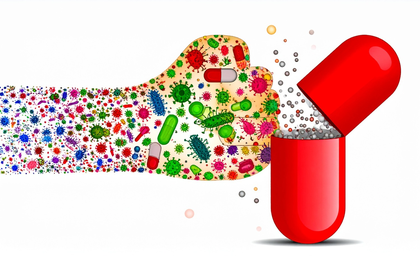Severe malnourishment in children under five years old can spike antibiotic resistance: Study
By IANS | Updated: August 2, 2025 15:24 IST2025-08-02T15:19:37+5:302025-08-02T15:24:49+5:30
New Delhi, Aug 1 Children under the age of five with severe malnourishment could be at significant risk ...

Severe malnourishment in children under five years old can spike antibiotic resistance: Study
New Delhi, Aug 1 Children under the age of five with severe malnourishment could be at significant risk of antimicrobial resistant bacteria, according to an alarming study.
Globally, 45 million children under the age of five are estimated to be severely malnourished. These children are also at a higher risk of developing life-threatening infections such as tuberculosis or sepsis due to their weakened immune systems.
The new study led by researchers at the Ineos Oxford Institute for antimicrobial research (IOI) has found that antimicrobial-resistant bacteria are spreading rapidly among children being treated for severe malnutrition in a hospital facility in Niger.
The findings, published in the journal Nature Communications, showed that 76 per cent of children carried bacteria with extended-spectrum beta-lactamase (ESBL) genes, which can break down many commonly used antibiotics.
One in four children (25 per cent) carried bacteria with carbapenemase genes like blaNDM, which confer resistance to some of the most powerful and last-line antibiotics.
“These are some of the most vulnerable children in the world, and we’re seeing them pick up bacteria that don’t respond to life-saving antibiotics,” said lead author Dr Kirsty Sands, Scientific Lead, Ineos Oxford Institute for antimicrobial research.
“While our study was focused on one treatment facility in Niger, this situation is likely mirrored in many more hospitals around the world. As AMR continues to increase globally, concurrent humanitarian crises such as wars and climate change are exacerbating malnutrition, leading to overcrowded treatment centres,” Sands added.
Antibiotics are life-saving medicines that are becoming ineffective due to antimicrobial resistance (AMR) -- a process in which bacteria, fungi, and parasites have developed the ability to resist the action of medicines.
Working with Médecins Sans Frontières (Doctors Without Borders), researchers analysed over 3,000 rectal swabs from 1,371 children under the age of five being treated for severe malnutrition between 2016 and 2017.
Nearly 70 per cent of children who did not carry carbapenem-resistant bacteria upon admission were found to carry them at discharge. Carbapenems are a class of last-resort antibiotics used when other antibiotics have failed to treat an infection.
Over 10 per cent of children were carrying E. coli ST167 strains with the blaNDM gene, which is of major concern because it limits treatment options for infections caused by these bacteria.
The study stressed the need to prioritise infection prevention and control measures in hospitals to protect the most vulnerable patients.
Disclaimer: This post has been auto-published from an agency feed without any modifications to the text and has not been reviewed by an editor
Open in app